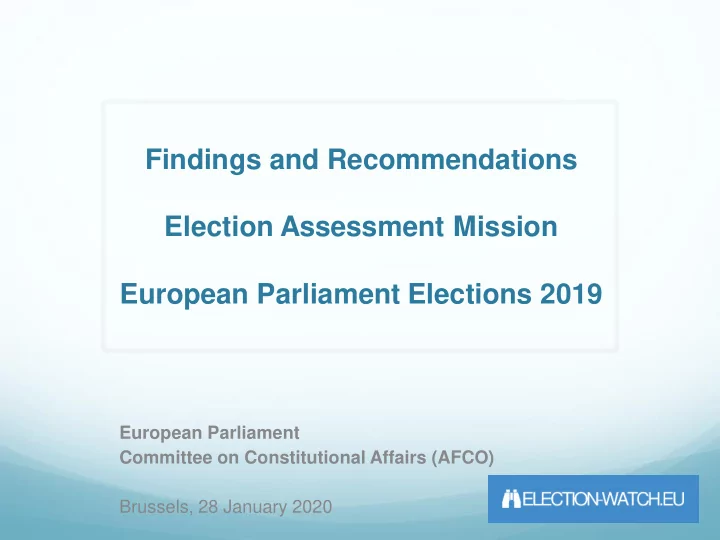

Findings and Recommendations Election Assessment Mission European Parliament Elections 2019 European Parliament Committee on Constitutional Affairs (AFCO) Brussels, 28 January 2020
Introduction - Who are we? - Why and how we engage in European elections? - Presentation of key findings - Key recommendations - Next steps -
Background - Network of European election observers - Declaration of Principles for Election Observers - Member of Global Network of Domestic Election Monitors Memorandum of Understanding “This Time I’m Voting” - - Social Media Monitoring during Austrian Snap Elections
Background - Needs Assessment Mission - Election Assessment Mission - 28 National Chapter Focal Points - 65 Election experts - 1 Coordination Team - 8 Organisations accross Europe
Objectives European integration & democratic resilience Enhanced citizen participation Promoting election observation Recommendations & electoral reform advocacy
Focus Areas - Adaptation of EU regulations and international standards 1. Differences of electoral calendars (voter registration) 2. Campaign finance regulations 3. Social media regulations 4. Electoral participation of persons with disabilities
- Restrictions for independent candidates - Voting with 16 years supported by EP - Varying levels of women representation - #thistimeImvoting campaign for young voters
- No equal access to vote - 15 EU MS offer postal voting - 4 EU MS still have proxy voting - No out of country voting in 6 EU MS - Internet voting in Estonia - Advance voting in 10 EU MS - 4 EU MS with compulsory voting
Key Findings Participation of Persons with Disabilities - Prioritise physical accessibility - Participation through alternative voting options - 13 MS guarantee the right to vote for all PWD without restrictions - 15 MS with limited suffrage rights (based on mental disability or lack of legal capacity) - EU acceeded to Convention on the Right of Persons with Discabilities (CRPD)
Key Findings - New regulatory framework and authority (APPF) - Unqueal conditions for parties and candidates - Foreign funding forbidden in half of the EU Member States - Public funding is available in all but 3 Member States
Key Findings Social Media Regulation Fears about large-scale disinformation campaigns and foreign interference Code of Practice for social media and online platforms Important to provide guidance, greater transpareny, and independent oversight
Key Findings Regulations for Election Observation (international – national) Regulations vary across EU MS – partly restrictive 8 EU MS have full legislation and accreditation systems in place 5 EU MS open voting and counting to the public Election-Watch.EU was accredited by12 EU MS
16 Recommendations Equality, Inclusion, Transparency, Accountability - Electoral reform process - Electoral system - Suffrage rights - Persons with disabilities - Voter registration - Civic education - Alternative voting methods - Campaign finance - Social media regulation - Election observation
Recommendations 3. The ‘ Spitzenkandidaten principle’ should be reviewed to ensure greater cohesion among European institutions and Member States regarding its purpose and expected impact, and to enhance clarity for the electorate.
Recommendations 5. Ensure the equality of the right to vote and to stand as a candidate across the EU - harmonize the requirements related to the minimum voting age, residency requirements, independent candidacy, permissible restrictions on suffrage rights, and measures to support the equal participation of women.
Recommendations 6. Remaining barriers to effective electoral participation of persons with disabilities should be removed, including those related to restrictions on suffrage rights based on mental/intellectual disability. Measures aimed at supporting independent and informed voting and decision-making by persons with disabilities should be prioritized.
Recommendations 7. To effectively elicit and prevent possible multiple registration and voting , the coordination and voter data exchange mechanisms between EU Member States require considerable improvement. Further guidelines could be developed to ensure the uniformity of format and the scope of data to be exchanged. Solutions need to be identified for the issue of different voter registration cut-off dates to facilitate data exchange within common timeframes and in a timely manner.
Recommendations 16. All EU Member States should explicitly allow for access and accreditation of international and national election observation according to international principles throughout the electoral process.
Conclusions - Great diversity in democratic practice Good practice examples – learning from each other - - Clear indications where improvements could be made Greater cohesion – complexity/diversity of electoral regulation - Greater efforts to protect European election integrity Electoral reforms to be taken up again – participatory process
New EU Policy Agenda of new Commission – beginning of electoral cycle Mission Letter to Commissioner Vera Jourová: Conference on the Future of Europe Amendment of the electoral law (EP and Commission) Building resilience of the democratic system Discussions to improve the lead candidate system & of transnational lists
Next Steps Report as reference for upcoming electoral reform debates Electoral reform advocacy at European and national level Participate in EU participatory electoral reform process (Conference on the Future of Europe?) Deepen and broaden European network of observers Preparation of Election Assessment Mission 2024
Thank You Questions & Exchange of Views Contact: kontakt@wahlbeobachtung.org @ElectionEu; @arminrabitsch
Recommend
More recommend